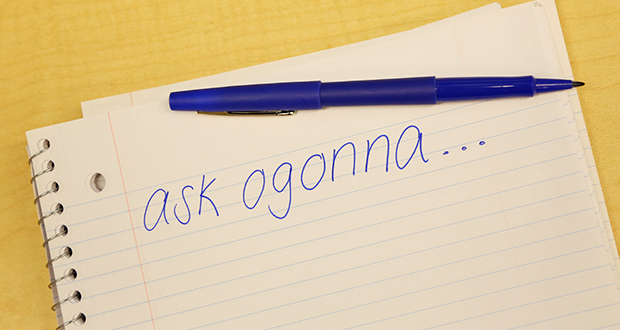Have a problem with love or life in general? Send Ogonna your questions at [email protected] and get them answered here in her column. You can also tweet her at @askogonna
Reader: What should I do when I feel like I’m forced into a friendship? Like, I feel obligated to hang out with certain people and check that off a list instead of actually wanting to hang out with them.
Ogonna: If you ever have to use the words “forced,” “obligated” and “checklist” to describe a bond between two people, that’s not exactly what I would describe as a friendship. That’s not any type of “ship” at all. In fact, you might have to consider jumping ship and floating peacefully in your own isolated sea until you can find a shore that you’re sure of.
I may be going a tad overboard with the puns, but the sentiment remains. Friendships are fun and freeing and lively and voluntary — all the opposite of forced.
Let’s start by finding the root cause of this situation: Why do we make friends? While we all make friends for infinitely different reasons, I believe that most of our best friendships come from a mutual desire for companionship, comfort, love and support. We find these types of friendships in those we are simply compatible with, whether it’s because we have opposite personalities or are basically the same person in a different body. We latch onto those people who just get us.
But let’s be honest. Some friendships are formed out of convenience or necessity. For example, we all have that go-to person in our classes who we latch onto when midterm season hits us hard and we need a study buddy to weather the storm with us. Or maybe you have that friend who is uber talented in ridiculous, mind-blowing ways. If you ever need to make a video for a class or want to win a cool contest, you know who to recruit.
Sometimes, we find that someone else considers us to be closer friends than we actually are in reality. We’ve been friends, real friends or fake friends, for so long that we can’t find a way out of this one-way street. Because of that pressure, we feel obligated to rise to the occasion of being in that “best friend position” where we feel like we have to hang out with them or comfort them or respond to their every need. If you don’t, who will?
In one way, that’s awesome. Not everyone can be everything to everybody all the time. We tend to go to different friends for different reasons, and we all have friends who come to us for certain things as well. But when your role as your friend’s advisor or only solid companion becomes more of a chore than a free-willed, enthusiastic decision, you might have to take a step back.
Look at the dynamic of the relationship. If you see that you feel dramatically unsupported and you keep giving and giving but aren’t getting anything back, point that out. Even the best of friendships can be draining. But if it’s worth it, they will make an effort to change and give you the type of support you need. And if you get to the point where you don’t even care to be friends anymore, reevaluate the type of relationship you want to have with that person. You don’t need to excommunicate them from your social circle, but perhaps a little distance won’t hurt. Tell that friend you can’t keep dropping everything to be there for them if you’re not getting anything back, and you have to take care of yourself first before you can take care of someone else.
Like hopping into a boat, friendships are something we choose to get into. Yes, there will be rocky rivers and turmoil ahead, but there will also be sunny days and peaceful waves that will ultimately result in smooth sailing ahead. If that’s not the type of friendship you’re in, someone might be walking the plank.

